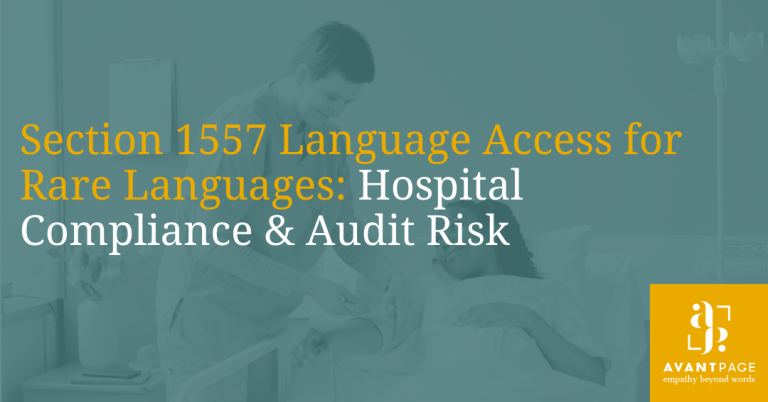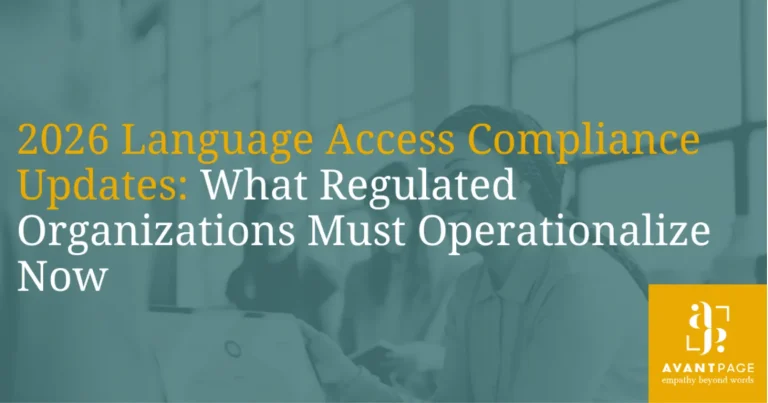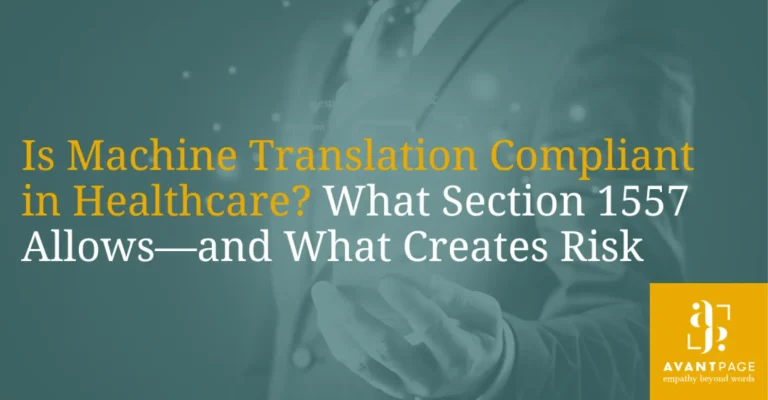The Quick Guide to Legal Translation
Legal translation services are critical in ensuring equal access to justice for individuals with limited English proficiency (LEP), as well as for organizations operating across jurisdictions, languages, and cultures. From government agencies and law firms to healthcare systems and nonprofits, many industries rely on accurate, certified translations of legal documents to stay compliant and protect all parties involved.
Translation services are valuable to many different industries, regardless of whether they are regulated and required or not. Some industries don’t have regulated requirements for translation, but benefit from it all the same. Legal translation improves accuracy throughout legal proceedings, protects civil rights, and supports fair representation. It can benefit all parties involved in a court case and help make the legal system more accessible to those who may need it.
Table of Contents
Who Needs Legal Translation Services?
What documents are involved in legal translation?
What services are needed for legal translation?
Who Is Required to Provide Legal Translation Services?
Benefits of Professional Legal Translation
What Is Legal Translation?
Legal translation is the process of converting legal documents, or interpreting for spoken language, from one language to another with high accuracy, preserving meaning, formatting, legal terminology, and tone. This includes both document translation and interpretation services, depending on the setting.
There are many different parts of the legal process that benefit from professional legal translation services. If you’re in the process of discovery, having documents translated by a qualified, certified legal translator can help to make the documents more accessible if you wish to submit them as evidence. In a hearing, having an interpreter can be necessary if the defendant, prosecutor, or any other involved party is Limited English Proficient (LEP). There are many other documents, like a will or power of attorney, that benefit from legal translation as well.
Legal translation should not be confused with general translation—legal language is highly technical, jurisdiction-specific, and full of nuanced terminology that requires trained human translators.
Who Needs Legal Translation Services?
Legal translation isn’t just for law firms, it’s also essential for:
- Immigration services and applicants
- Government agencies handling multilingual constituents
- Hospitals and healthcare networks providing consent forms and liability documents
- Real estate companies operating in multilingual communities
- Financial institutions involved in international transactions or arbitration
- Corporations with multilingual employees and global partners
- Courts and clerks in need of accurate transcripts, affidavits, or summonses
Any organization working with contracts, compliance, or litigation should consider legal translation a necessity, not a luxury.
What documents are involved in legal translation?
While each legal proceeding has its own requirements, there are many types of documents commonly translated in support of court cases and legal processes. These include:
- Patents/Intellectual property documents
- Contracts and agreements
- Affidavits and depositions
- Litigation documents
- Court transcripts & hearing recordings
- Wills & estate documents
- Insurance policies and claim documents
- Non-disclosure agreements (NDAs)
- Adoption papers
- Name change documentation
- Birth and death certificates
- Immigration documents (I-130, I-485, etc.)
- Real estate and lease agreements
Each of these documents requires accurate translation that reflects not just language, but also jurisdiction-specific legal standards.
What services are needed for legal translation?
Beyond document translation, the legal industry benefits from a range of legal language services, including:
- Certified translation services for immigration or court submissions
- Legal interpretation (in-person, over-the-phone, or via video)
- ADA-compliant translation for individuals with disabilities
- Localization services for global or multilingual jurisdictions
- Proofreading and formatting for legal documentation
- Human translation with legal subject-matter experts
- Fast turnaround time for urgent filings or hearings
Machine translation tools may be useful in casual settings, but they’re unsuitable for legal use due to a lack of confidentiality, accuracy, and contextual understanding.
Who Is Required to Provide Legal Translation Services?
While not every organization is legally obligated to provide translations, many are, especially when federal funding is involved. Under Title VI of the Civil Rights Act, any agency receiving federal funding (including courts, schools, and hospitals) must ensure meaningful access to information for LEP populations.
Other legal frameworks include:
- Executive Order 13166: Requires federal agencies and federally assisted programs to improve access for LEP populations.
- Americans with Disabilities Act (ADA): Includes provisions for accessible communication, which may include translated content.
- Affordable Care Act (ACA): Requires qualified health plans to provide translated documents.
Failing to provide accurate translations can result in legal liability, civil rights violations, and loss of public trust. Learn more about why language access is a civil right.
Benefits of Professional Legal Translation
- Accuracy in legal terminology
- Compliance with federal, state, and local regulations
- Reduced risk of misinterpretation or litigation
- Better access to justice and public services
- Credibility and trust with multilingual populations
- Improved cross-cultural communication
- Support for diverse language pairs, including Spanish, Chinese, Arabic, Russian, Korean, Portuguese, French, Japanese, Italian, and more
Certified legal translators bring linguistic fluency, cultural understanding, and legal expertise to every project—something machine translation alone simply can’t do.
Frequently Asked Questions About Legal Translation Services
What is legal translation?
Legal translation refers to the translation of documents and oral communication involving legal language, contracts, court procedures, and laws across different target languages. It must be precise and is often performed by certified professionals familiar with both legal systems and professional translation services.
Do legal documents need certified translations?
Yes. Certified translations are often required for immigration forms such as immigrant housing assistance documents, court filings, or official contracts. A signed certificate of accuracy ensures the translation meets legal standards.
Can I use machine translation for legal documents?
No. Machine translation lacks the accuracy, confidentiality, and cultural nuance required for legal documents, risking the integrity and outcome of a legal proceeding. Always use a professional human translator for anything involving legal, compliance, or regulatory contexts.
Who is responsible for providing legal translations in court?
Courts and public agencies receiving federal funds are often required under Title VI and Executive Order 13166 to provide language access services for LEP individuals. This may include interpretation and translation of forms, notices, signage, and records.
What languages are most commonly needed for legal translation?
In the U.S., commonly requested languages include Spanish, Chinese, Arabic, Russian, Vietnamese, Korean, Portuguese, and Tagalog, though needs vary by region and case.
How do I ensure confidentiality in legal translations?
Work with a Language Service Provider (LSP) like Avantpage that offers secure, encrypted systems and has experience with HIPAA, FERPA, and legal confidentiality standards.
What’s the difference between legal interpretation and legal translation?
Translation involves converting written text, while interpretation refers to converting spoken language in real-time. Both require specialized skills in legal terminology and cultural fluency.
Ensuring Appropriate Legal Translation
To be sure that your legal documents are accurately and appropriately translated, you need to use subject matter experts as translators. Your legal translation projects should be handled by certified, qualified translators who have experience in the legal industry.
At Avantpage, we provide accurate, certified, and compliant legal translations in over 150 languages. Our translators are legal subject matter experts who meet strict confidentiality and formatting standards.
Call us at (530) 750-2040 or request a quote to get started today.


